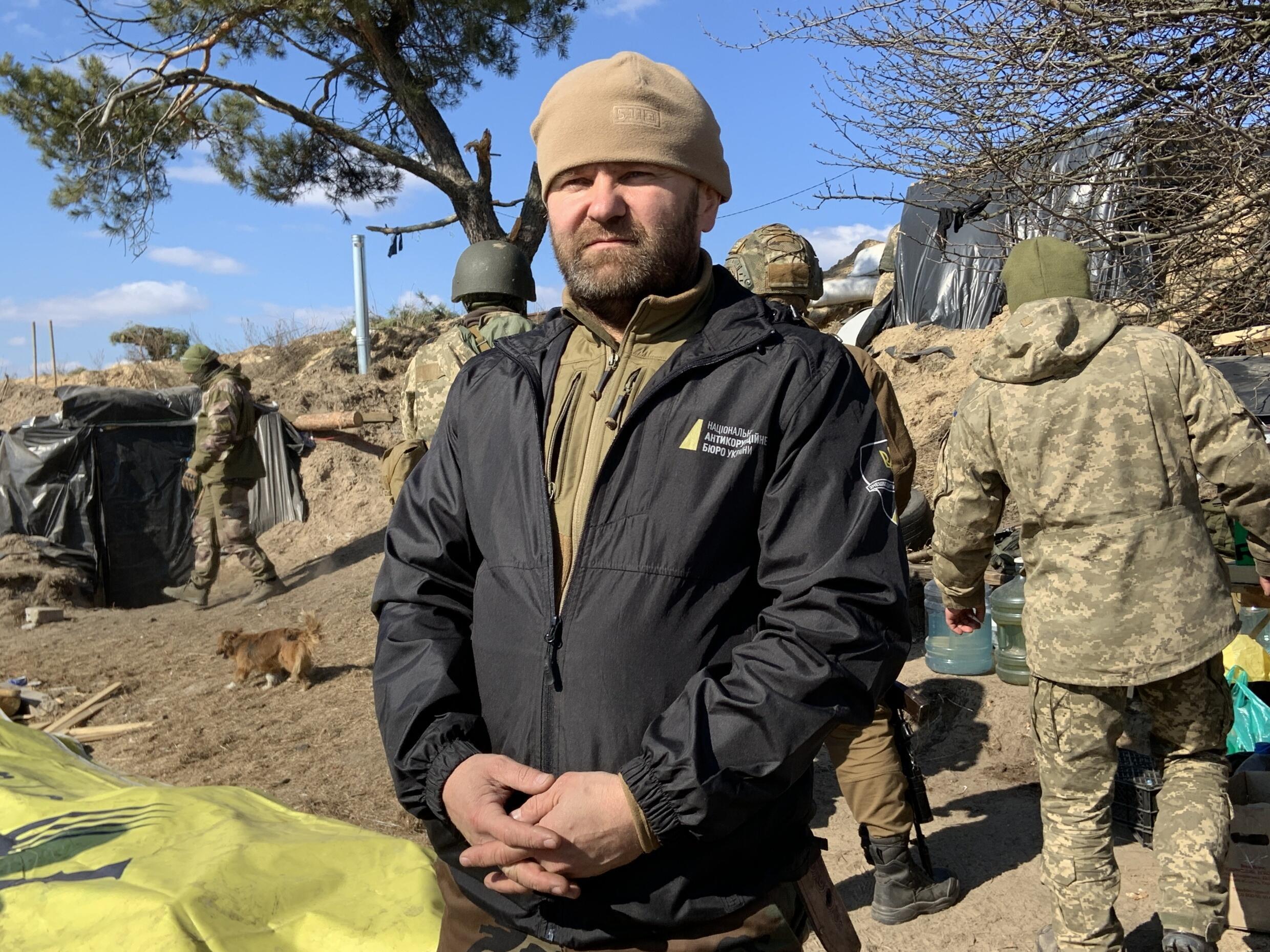Set up some 30 kilometres north of Kyiv, the Ukrainian army’s lines of defence have so far succeeded in preventing Russian troops from advancing on the capital. The anti-tank missiles provided by Western allies have handed the Ukrainian soldiers a sense of courage and hope. Embedded with the Ukrainian Army’s 72nd Brigade, FRANCE 24 reports from the frontline.
The empty highway passes one checkpoint after another. Beyond the concrete blocks and the stacked sandbags, you can make out burnt-out buildings and battered civilian and military vehicles. Since Russia launched its invasion of Ukraine on February 24, this area has been the scene of several intense battles.
In military terms, this is a strategic position. Should the Ukrainian army give way here, the Russian army would be able to enter Kyiv and have a clear path to one of the Ukrainian capital’s three airports.
We are guided by a Ukrainian soldier who was a journalist just a few weeks ago. He brings us to the strategic position that the Ukrainians have been “holding” for three weeks now. Oleksander has probably never fired a gun in his life before, but for the past three weeks, he’s been donning military fatigues, serving the Ukrainian army by handling its public relations.
After a quick coffee, served in an abandoned factory, we join the 72nd brigade. An anti-tank missile launcher stands atop a bridge, on which a banner has been hung: “Welcome to Hell”, it reads in Russian. The invaders have been warned.
Finally, we arrive at one of the defence lines preventing Russian forces from entering the city. We are told the enemy could be as close as 500 metres or as far as five kilometres away. A few automatic gunshots and muffled detonations pierce the calm that otherwise envelops this part of the Ukrainian countryside.
A few hundred metres away, a column of black smoke slowly rises into the sky. It’s from a Russian vehicle that has been burning for days. Nearby, small groups of soldiers keep guard, assembling makeshift heated shelters to keep warm in the still-freezing March temperatures.
"We have electricity, water, food. We’re not hungry and we have been holding our position since February 24," a 23-year-old soldier, who goes by the nickname “Firefighter”, says. "If it’s quiet, it’s because the enemy has suffered a lot. Our tanks demolished them and we destroyed 30 Russian vehicles. In front of us, we think they only have two tanks left that are in battle condition. I doubt the Russians have much morale left.”
Although no one really knows the true extent of the losses the two sides have suffered, it is clear that the Russian forces have so far failed to break through here – even though they have tried several times.
"I am 100 percent sure my brigade won’t let the Russians get through to Kyiv, because we are on our land here. Most of the soldiers deployed to this position are from the region. Some of them have seen their houses destroyed by the Russians, so we’re very motivated.”
A little further on, a man gets out of a white Japanese sedan. “It's a hybrid”, he says proudly. He is a volunteer who has worked to support the troops since the very first days of the war. He has driven from a nearby town to check whether they need anything.

"I started by digging trenches, and then by finding anything else the soldiers might need, like food and all the rest: wood, nails, medicine, clothes and of course hot meals prepared at the volunteer headquarters.”
“[Before] the Russians started crushing everything under their boots”, he worked in a company's timber sector. Just like his fellow soldier "Firefighter," he doesn’t doubt for a second that the Ukrainians will win this war. “I’m 100 percent sure that the Russians won’t make it any further. They would need a thousand tanks! Tactically, they are losing because our defences have been heavily reinforced, we have tanks, artillery, ammunition, weapons.”
Many observers say the presence of portable anti-tank missiles – which the West began urgently supplying in January – has undoubtedly changed the situation for the Ukrainians. Dozens of empty missile crates are lined up along this particular defence route. The trenches are dotted with timber bunkers and full crates with missiles are nearby, ready to use.

"What you saw there were anti-tank missiles: Javelins, Stugna, NLAWs, and we have many more in other positions," Firefighter says. The American-, Ukrainian- and British-made arms have become emblems of Ukraine’s stubborn resistance to Vladimir Putin’s "special operation".
"We’re grateful to receive help from abroad to fight for the freedom of Ukraine. But I don’t think the sanctions will work. The real sanctions are our artillery and our troops,” says this calm, young soldier.
The fact that the soldiers have managed to hold the position for three weeks now appears to have boosted troop morale. "We have better tactics and we have allies who provide us with weapons," says the fix-it-all volunteer.
As we leave the frontline, our guide Oleksander explains that the military strategy has been to install mobile, rather than fixed, defences to defend Kyiv. It makes it easier to manoeuvre and more difficult for the Russian Air Force to destroy.
It is a brave choice that has so far allowed the Ukrainian capital to resist to the best of its ability. The former journalist, who has now changed into khaki-coloured fatigues, ends by citing former Israeli Prime Minister Golda Meir, born in Kyiv in 1898: "We intend to remain alive. Our neighbour wants to see us dead. This is not a question that leaves much room for compromise”.
This article has been translated from the original in French.







